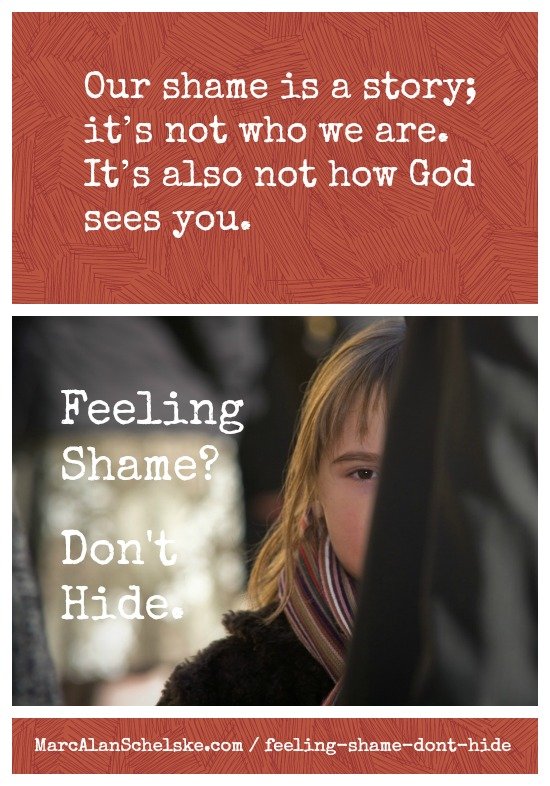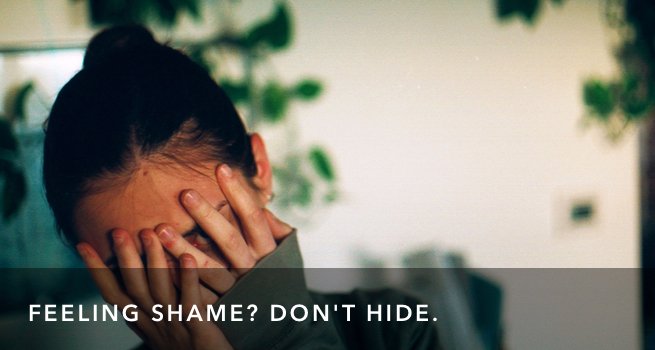4 min. to read.
When something terrible happens to you, or when you’re facing some brokenness or addiction in your life.
Whether something was done to you, or you did something, the common denominator is shame. It’s that twisted knot in your gut saying that you will be judged, shunned, looked down on. Shame says you are right to be afraid. Quite naturally, your gut instinct is to hide.
That instinct is so very often wrong.
Are you going MIA?
- A couple stops showing up to our midweek home group. They’ve been active and engaged, but then they’re just gone. Work schedule, and kid’s sports, and all kinds of justifiable reasons are mentioned, but the result is that they just go missing.
- A teen-ager stops going to church, or stops hanging out with their friends or goes unexpectedly silent.
- Conversations with a long-time friend turn more and more shallow over months until you’re no longer talking about real things.
- A young man stops going to his weekly AA meetings. Life just got busy, I guess.
I’ve seen this so often in 18 years of working with people, I’m starting to be able to predict it. Good people, people who have healthy community around them, people in churches, people in recovery – they all do it.
hen shame rolls in, they withdraw.

At first withdrawing feels like an improvement, a relief. If you’re feeling shame, then staying away from the people you fear might judge or shame you is a burden lifted. You don’t have to deal with them.
But it’s a trap.
Your own withdrawal puts you into isolation. In isolation you begin to think:
- Nobody understands me.
- Nobody wants to be with me.
- If anyone knew my story, they’d hate me, judge me, put me out…
Isolation denies you access to the very thing you need most: loving, supportive community. Very often we are hurt in the context of relationship. When our hurt originated in relationships, God often seems to use relationships to bring us healing.
Telling the truth requires ears to hear you.
In the little book of James, we find an odd instruction. It says, “Confess your sins to one another and pray for one another, so that you may be healed.” (James 5:16 HCSB) Normally in Christianity, we link up confession with forgiveness. We confess our sins in order to be forgiven. But James says something else. He says we confess in order to be healed.
James doesn’t just say, “Tell the truth.” He says, “Tell the truth to one another.” Here we see the power of God working through relationships.
Confession is an intimate and honest sharing of what’s true about us. Sometimes it’s confessing some wrong we’ve done. But many times, it’s confessing what’s been done to us, admitting to another human being why we feel ashamed. When we do that we open up a relational space where we are truly known, and the possibility exists for someone to speak grace and love into the places where we feel broken.
The healing begins, according to his little verse, after we’ve had the courage to look another person in the eyes and tell the truth about our shame.
When we take the enormous, intimidating risk to tell our truth to a trustworthy person, to let them see us in our shame, they can help us see something new. Our shame is a story; it’s not who we are. It’s also not how God sees you.
The circumstances we were a part of do not need to define us. Their response to us is an avenue of God’s grace. When grace flows in and washes out shame, healing begins.

This has certainly been a major factor in my in/out presence in our faith community. However, I think that shame is good at disguising itself and insidiously misdirects people who are experiencing it into believing that reasons and conditions other than shame are at work. It’s difficult for me to always recognize when I am feeling shame, rather than feeling offended of critical.
I’ve experienced that too.
I think one of the give-aways is being offended. Peter Scazerro suggests that a quick gauge of our emotional and spiritual maturity is “how offendable we are.” Being offended is often an outward manifestation of entitlement. It’s also often an expression of unspoken expectations. More often, though, it’s an emotional reaction rooted in our need to be seen as right, whole, valuable, good, etc.
I’m trying, in my own life, when I feel offended to query that feeling and trace it back to its roots. Why am I feeling violated by this person’s words or actions?
Mark, I’ve been looking at some of Brene’ Brown’s work on shame recently and she has done some very powerful research into how shame leads to all sorts of self damaging things including perfectionism. Guilt is all about us doing something bad, shame is all about us being bad. Keep up the great thoughts.
Her work on shame is really good and interesting. For Christians (and probably all religious people) the distinction between guilt and shame that you make is so important. Guilt is about an objective reality, something done for which we are accountable. Before God we are all guilty of lots of things. But shame is that deep emotional sense of unworthiness, being essentially wrong and bad. I just don’t see God relating to us in that way.
Marc have you read Chris McAlister’s book Sight Shift. It addresses shame as well. Highly recommended. Great post.
I haven’t. I’ll check it out. I always love book recommendations. Thanks.